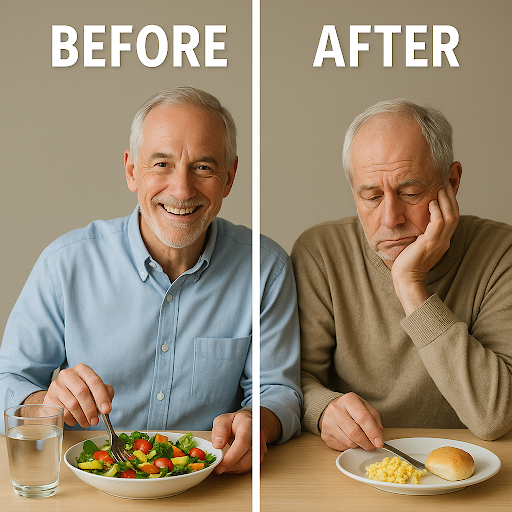A Scientific Comparison With Practical Tips
As we age, proper nutrition becomes a key pillar of health, immunity, and overall quality of life. Many people over 50 seek to manage their weight or prevent chronic diseases and find themselves torn between two options: a balanced, sustainable diet or a fast-result crash diet.
So, what’s the difference between the two? And which is better for people after 50? Let’s explore this in detail.
🥗 What Is a Balanced Diet?
A balanced diet includes all food groups—carbohydrates, proteins, healthy fats, vitamins, minerals, and fiber—in moderate amounts. It emphasizes variety, consistency, and enjoyment without deprivation.
✅ Key Benefits:
-
Provides consistent energy throughout the day.
-
Maintains muscle mass and prevents age-related muscle loss.
-
Enhances mood, memory, and cognitive function.
-
Reduces the risk of chronic diseases like diabetes and hypertension.
-
Sustainable and easy to follow in the long term.
🔸 Tip: Balance doesn't mean perfection. You can enjoy occasional treats guilt-free if your overall intake is healthy.
🚫 What Are Crash Diets?
Crash diets are highly restrictive eating plans that significantly cut calories or eliminate entire food groups (like carbs or fats), often with the promise of quick weight loss.
❌ Common Examples:
-
Juice-only diets
-
Extreme ketogenic diets
-
Water fasting or prolonged intermittent fasting
-
One-food diets (like only bananas or eggs)
❗ Dangers After 50:
-
Loss of muscle mass instead of fat
-
Blood sugar and blood pressure instability
-
Poor absorption of essential vitamins and minerals
-
Weakened bones, higher risk of fractures
-
Fatigue, brain fog, and irritability
-
Slowed metabolism and weight regain
⚠️ After 50, drastic calorie restrictions can harm rather than help. Your body needs smart nourishment, not starvation.
🧓 What’s Better After 50?
Scientifically and practically, a balanced diet is by far the better choice. It gives your body what it needs as it ages, without mental or physical stress.
🧠 It supports:
-
Memory and cognitive health
-
Heart and metabolic function
-
Emotional well-being and resilience
🛠️ Practical Tips for a Balanced Diet After 50
-
Eat 3 main meals and 2 light snacks daily.
-
Fill half your plate with vegetables—raw, steamed, or roasted.
-
Choose lean proteins: eggs, lentils, or grilled fish.
-
Limit sugar, soda, and processed foods.
-
Stay hydrated—drink 6–8 glasses of water daily.
-
Opt for whole grains like oats and whole wheat.
-
Talk to a nutritionist if you have chronic conditions or take medications.
🟢 Conclusion
While crash diets may promise fast results, they often come with long-term consequences, especially for those over 50. A balanced diet, on the other hand, is a wise investment in your long-term health, energy, and quality of life.
💬 “Moderation is the key to wellness. A balanced diet is your bridge to active, graceful aging.”

